
ENVIRONMENTAL HEALTH PERSPECTIVES
Scope & Guideline
Innovating solutions through rigorous environmental health research.
Introduction
Aims and Scopes
- Environmental Exposures and Health Outcomes:
Research articles investigate how various environmental factors such as air pollution, chemical exposure, and climate change affect health outcomes including respiratory diseases, cardiovascular conditions, and developmental issues. - Epidemiological Studies:
The journal emphasizes epidemiological studies that assess the relationships between environmental exposures and health effects, often utilizing cohort, case-control, and cross-sectional study designs. - Toxicological Assessments:
It includes studies that evaluate the mechanisms by which environmental pollutants cause harm at the cellular or molecular level, incorporating in vitro and in vivo models. - Policy and Public Health Implications:
Papers often discuss the implications of research findings for public health policy, regulation, and community health interventions, particularly focusing on vulnerable populations. - Community Engagement and Participatory Research:
The journal promotes research that involves community participation and addresses environmental justice to ensure equitable health outcomes. - Innovative Methodologies:
It highlights novel research methodologies, including advancements in exposure assessment, data analytics, and risk modeling related to environmental health.
Trending and Emerging
- Impact of Climate Change on Health:
Recent publications are increasingly addressing how climate change affects public health, including heat-related illnesses, vector-borne diseases, and mental health outcomes. - Chemical Mixtures and Cumulative Exposures:
There is a growing trend towards exploring the health impacts of exposure to chemical mixtures, moving beyond single-chemical studies to understand complex interactions. - Environmental Justice and Disparities:
Research focusing on environmental justice, particularly studies addressing disparities in exposure and health outcomes among marginalized communities, is gaining prominence. - Microplastics and Human Health:
The emerging concern regarding microplastics and their health implications is reflected in an increasing number of studies exploring their biological effects and exposure routes. - Mental Health and Environmental Factors:
There is an upward trend in exploring the connections between environmental exposures and mental health outcomes, acknowledging the psychological impacts of environmental stressors.
Declining or Waning
- Traditional Chemical Risk Assessment:
As the field evolves, there is a noticeable decline in papers focused solely on traditional chemical risk assessments without consideration of cumulative or synergistic effects of multiple exposures. - Single-Pollutant Studies:
Research that isolates the effects of single pollutants is declining in favor of studies that examine the impacts of multiple pollutants and complex mixtures on health outcomes. - Focus on Historical Data Analysis:
There has been a waning interest in retrospective studies that rely heavily on historical data without integrating contemporary methodologies or real-time exposure assessments. - General Environmental Health Education:
The journal's emphasis on broad environmental health education topics appears to be diminishing, with a shift toward more specific, actionable research findings that can directly influence policy and practice.
Similar Journals
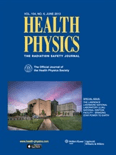
HEALTH PHYSICS
Bridging Disciplines for Enhanced Health OutcomesHEALTH PHYSICS is a leading academic journal dedicated to the study and dissemination of knowledge in the fields of radiology, epidemiology, and health toxicology. Published by Lippincott Williams & Wilkins, this esteemed journal has been a cornerstone of research since its inception in 1958, and it continues to foster important discussions and advancements in the discipline. With a notable impact factor and consistently ranking in the Q2 and Q3 quartiles across various categories in 2023, HEALTH PHYSICS serves as a vital resource for scholars, practitioners, and students seeking the latest insights and methodologies in the management of radiation exposure and its health implications. While the journal does not offer open access, it remains a critical platform for peer-reviewed articles that contribute to public health and environmental safety. The journal's comprehensive scope and historical significance underscore its importance in advancing knowledge and practices within its field, making it an essential read for anyone engaged in the multidisciplinary realms of health physics.

Current Environmental Health Reports
Transforming research into actionable solutions for public health.Current Environmental Health Reports, published by SpringerNature, is a leading journal dedicated to advancing research in the multifaceted domains of environmental health. With an impressive impact factor and a distinguished Q1 ranking in several categories—such as Health, Toxicology and Mutagenesis, Public Health, and Environmental Science—this journal provides a premier platform for scholars, researchers, and professionals to disseminate their findings. Since its inception in 2014, it has showcased critical studies that address pressing environmental issues, health risks, and regulatory frameworks, guided by a commitment to high-quality research and policy dialogue. Whether through original research articles, reviews, or policy perspectives, Current Environmental Health Reports strives to inform and influence practice and public policy in environmental health, making it an essential resource for those engaged in this vital field. Accessible only through institutional subscriptions, the journal continues to illuminate the interplay between environmental factors and human health through innovative and impactful scholarship.
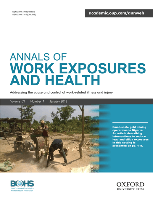
Annals of Work Exposures and Health
Exploring the intersection of work and well-being.Annals of Work Exposures and Health, published by Oxford University Press, stands as a leading journal dedicated to the field of public health with a particular focus on environmental and occupational health issues. Since its inception in 2016, the journal has provided a robust platform for disseminating high-quality research, boasting an impressive impact factor that reflects its rigorous peer-review process and significant contribution to advancing knowledge in the field. With its open access model, the journal ensures that critical findings are readily available to researchers, professionals, and students, fostering a collaborative spirit in tackling the challenges associated with work-related health exposures. As of 2023, it ranks in Q2 in its category, positioned within the 69th percentile in Scopus, illustrating its influence and relevance in the ongoing discourse surrounding occupational health. The Annals continues to attract diverse contributions that aim to inform policy and practice, making it an essential resource for anyone involved in public health research and advocacy.
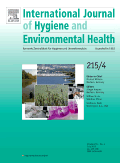
INTERNATIONAL JOURNAL OF HYGIENE AND ENVIRONMENTAL HEALTH
Pioneering excellence in hygiene and environmental health research.International Journal of Hygiene and Environmental Health, published by Elsevier GmbH, stands at the forefront of research in the fields of public health, environmental, and occupational health. With an impressive impact factor that underscores its significance—ranking #30 out of 665 journals in its category, placing it within the top 5%—the journal is a vital resource for academics and professionals seeking to expand their knowledge and contribute to advancements in the field. Since its inception in 2000, the journal has continually evolved, with its Q1 quartile designation reflecting its high-quality contributions and rigorous peer-review process. Accessible to a global audience, it offers flexible open access options, promoting the dissemination of critical findings on hygiene and environmental health issues. Published in Germany, the journal serves as an essential platform for researchers, educators, and practitioners to share innovative studies, timely reviews, and insightful discussions, driving forward the dialogue on public health challenges and solutions in today's world.

Air Quality Atmosphere and Health
Advancing Knowledge for a Healthier AtmosphereAir Quality, Atmosphere and Health is a leading interdisciplinary journal published by Springer, focusing on the intricate relationship between air quality and public health. With roots dating back to 2008, the journal has established itself as a pivotal resource for researchers and professionals in the fields of Atmospheric Science, Health, Toxicology and Mutagenesis, and Pollution Management and Policy, achieving a commendable Q2 ranking across multiple categories in 2023. The journal’s rigorous peer-review process ensures that it publishes high-quality research that addresses contemporary challenges in air quality management and its impact on health outcomes. With no Open Access option, the journal maintains a model that prioritizes valuable insights for subscription holders, making it an essential reference point for advancing knowledge on environmental health issues. The journal is based in the Netherlands and contributes significantly to the understanding of atmospheric pollutants and their effects, evidenced by its strong Scopus rankings, positioning it in the top percentiles of various environmental science categories.

Environmental Epidemiology
Bridging disciplines to tackle pressing environmental health challenges.Environmental Epidemiology is a leading open-access journal published by Lippincott Williams & Wilkins, dedicated to advancing the field of environmental and public health research. Since its establishment in 2017, this journal has emerged as a vital platform for scholars and practitioners interested in the intricate relationships between environmental factors and health outcomes. With an impressive impact factor reflecting its rigorous peer-review process and a robust Scopus ranking—notably holding Q1 positions in categories such as Health, Toxicology and Mutagenesis, and Public Health—this journal is essential for those seeking to explore the latest findings and methodological advances in environmental epidemiology. Open access since 2018, it ensures wide dissemination of research findings, promoting accessibility and engagement among a global audience of researchers, policymakers, and students. As it continues to converge through 2024, Environmental Epidemiology remains committed to publishing high-quality articles that address pressing environmental health challenges, fostering interdisciplinary collaboration and knowledge sharing that is crucial for developing effective public health interventions.
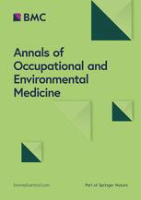
Annals of Occupational and Environmental Medicine
Connecting Research and Practice for Occupational ExcellenceAnnals of Occupational and Environmental Medicine is a premier open-access journal dedicated to the interdisciplinary study of occupational and environmental health, published by the Korean Society for Occupational & Environmental Medicine. Since its inception in 2013, this journal has become a key platform for researchers, professionals, and students alike to disseminate findings that contribute to the understanding and improvement of health in the workplace and surrounding environments. With an ISSN of 2052-4374 and ranked in the Q3 category (2023) in Public Health, this journal emphasizes innovative research and evidence-based practices in the field. Insights from the Scopus ranking, placing it at #428 out of 665 in its category, highlight its growing impact, despite being positioned in the 35th percentile. Its open-access model ensures that valuable knowledge is readily available, fostering collaboration and progression towards healthier work and living conditions globally. With an ambitious convergence of research spanning from 2014 to 2024, the journal stands as an essential resource for those committed to advancing occupational and environmental health.

Environmental Health
Exploring the Impact of Environment on Public Well-BeingEnvironmental Health is a premier, peer-reviewed journal dedicated to advancing knowledge in the interdisciplinary field of environmental health. Published by BMC since 2002, this Open Access journal aims to disseminate impactful research that addresses the critical intersections between environmental factors and public health. With its impressive stature as a Q1 journal in key categories, including Health, Toxicology and Mutagenesis, Medicine (miscellaneous), and Public Health, Environmental and Occupational Health, it ranks within the top tier of its field, boasting significant visibility and a high impact factor as demonstrated by Scopus rankings. Scholars and practitioners alike benefit from its well-rounded approach and commitment to bridging science and policy, making it essential reading for anyone invested in understanding and mitigating environmental health risks. The journal is based in the United Kingdom, with a focus on promoting global accessibility to its findings.

Environmental Health and Preventive Medicine
Empowering communities with vital health knowledge.Environmental Health and Preventive Medicine is a leading, peer-reviewed journal published by the Japanese Society for Hygiene, dedicated to advancing the field of environmental health and preventive medicine. With an impressive Impact Factor and ranking within the top quintile (Q1) in both Medicine (miscellaneous) and Public Health, Environmental and Occupational Health categories, this journal is recognized for its high-quality research and significant contributions to public health discussions globally. Established in 1996 and transitioning to an Open Access model since 2008, it provides unrestricted access to important findings that serve a diverse audience, including researchers, practitioners, and students. The journal's scope encompasses a wide range of topics essential for understanding environmental health issues and formulating effective preventive strategies, making it an invaluable resource for anyone engaged in health policy, environmental science, or community health initiatives. With an active readership and impactful research, Environmental Health and Preventive Medicine continues to influence the future direction of public health and environmental policies.
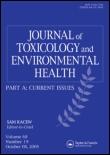
JOURNAL OF TOXICOLOGY AND ENVIRONMENTAL HEALTH-PART A-CURRENT ISSUES
Empowering Research for a Healthier EnvironmentJOURNAL OF TOXICOLOGY AND ENVIRONMENTAL HEALTH-PART A-CURRENT ISSUES, published by Taylor & Francis Inc, stands as a key resource in the interdisciplinary field of toxicology and environmental health. Operating under the ISSN 1528-7394 and E-ISSN 1087-2620, this journal maintains a strong presence with a Q2 category ranking in Health, Toxicology and Mutagenesis and a Q3 ranking in Toxicology as of 2023. It aims to disseminate critical findings that address contemporary issues in toxicology and environmental health, emphasizing the implications of environmental agents on human health. The journal offers both subscription and open access options, making cutting-edge research accessible to a diverse readership. With coverage of key topics from 1998 to 2024, it is an essential platform for academics, professionals, and students seeking to stay at the forefront of environmental health sciences.